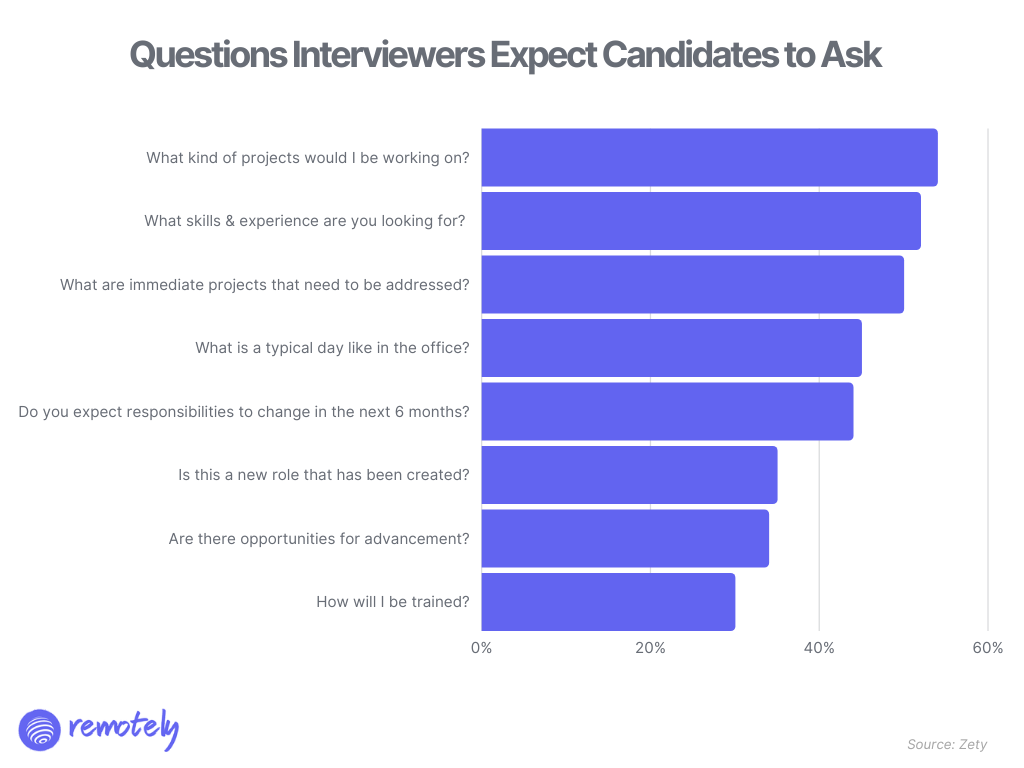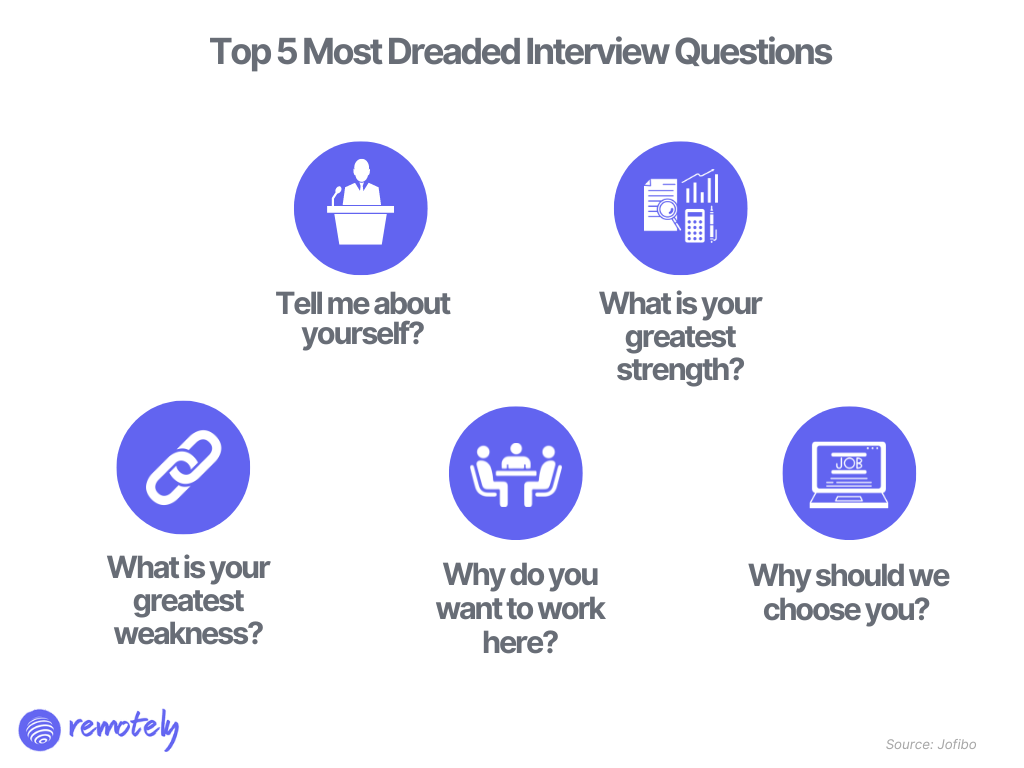For job seekers
For companies
For job seekers
For companies
Updated May 25, 2023 by Axel Grubba
Ready to find a remote job? Or expand your remote business?
Browse jobsJob interviews are the tried-and-true method companies use to pick the best candidate for a job. A job interview can stretch out for several rounds, each with different formats and question types.
 Image Source: Zety
Image Source: Zety
If a candidate makes it to the last round, there’s a good chance they’re being seriously considered for the position. But recruiters and management usually need to do a final check to ensure they’re hiring the right person. To that end, they’ll typically use a tough set of final interview questions.
In this article from Remotely, we’ll show you what final interview questions are typically asked and how you can ace them.
Final interview questions, as the name implies, are questions that are asked during the final round of job interviews.
At this stage, the candidate pool will have been narrowed down to two to five of the most promising candidates. Final interview questions allow companies to shortlist their applicant pool even further, and anyone who remains after this last round is the one that receives the job offer.
The final interview questioning stage is an opportunity for recruiters to ask any remaining questions they have. Any data they need to gather about the candidate will also be collected at this stage.
Final round interview questions tend to be the make-or-break point of an applicant’s hiring process. Even if you ace previous interview rounds and reach the final interview stage, there’s still a risk you might not get the job, depending on how well you answer the final interview questions.
Usually, by the time you reach the final round of the interview stage, all of the technical questions and tests will already be done. At this point in the hiring process, the recruiters already know that you have the skills and knowledge for the job.
So, rest assured, technical questions usually won’t appear at this stage.
But skills and knowledge aren’t enough. Recruiters need to gauge whether you would fit into the company’s culture and be able to form long-term relationships with colleagues as well. That’s why most final interview questions tend to focus on behavioral questions and relationship-type questions.
 Image Source: Jofibo
Image Source: Jofibo
Behavioral questions are designed to test your emotional intelligence (EQ), personality, attitude, and motivation. Meanwhile, relationship-type questions will explore your suitability for the company and how you’ll contribute to the office dynamic.
Other than the recruiter, senior members of management usually join the final interview session. This makes the decision-making process on who to pick more objective.
For smaller companies, the CEO and other C-suite executives may attend. But for larger companies, it’ll usually be the HR managers and team leaders who observe the candidate’s performance in this round.
As a result, final round interview questions with the CEO and upper management can be extremely high-pressure. Be sure to anticipate and practice answering as many potential questions as you can before coming to the interview. For remote interviews, you’ll likely receive notification of who will be participating allowing you to mentally prepare your answers.
There will still be a small pool of promising applicants left by the time the final interview rolls around. Unfortunately, openings are limited. That’s where final interview questions come in: they can help recruiters further narrow down their list so that only the very best applicants will receive job offers.
As we said earlier, the candidates’ qualifications will have already been assessed at this point. All that’s left is to see whether they would fit into the company.
Final interview questions help the company determine which candidate fits better and works well within the company culture. They can also help the recruiters see whether the candidates will be able to bring fresh ideas and energy to the company, as well.
Behavioral questions are notoriously difficult to answer. Unlike technical answers, you can’t study for them. That’s why you need to anticipate and prepare answers to common questions before you go in for the final interview.
Besides giving you an easier time responding to the interview’s inquiries, great preparation will also come with greater confidence. And confidence is key in acing interviews. Interviewers prefer confident candidates and give them more positive assessments.
We’ll show you a few sample questions in a later section.
The STAR approach is an excellent method for answering behavioral questions. It’s an acronym that stands for:
Follow this story-telling structure, and each behavioral question will be clear and easy to follow.
As one of the final candidates, the final interview is your last opportunity to make an impression on the interviewers and the hiring panel. So, you need to put extra work into preparing in this round to really stand out, especially if you think you didn’t do as well as you had hoped in earlier rounds.
Questions for final interviews tackle more pertinent and sensitive questions that are important to the job.
The interviewers ask this question to know whether your expectations are within their budget for the position. If you don’t already know what they’re expecting or the industry’s average, play it safe and flip the question:
A: “I’m open to further discussion about this matter. What’s the range that you have in mind?”
If you’ve already done your research, answer using a range rather than a specific figure. Also, tell them you’re willing to negotiate, just in case you go over their budget.
A: A fair number is between $90,000 and $100,000. I’ve researched the average salary for this position and looked at how much other companies pay, and I think this is an acceptable range. But I’m willing to negotiate further.
It’s important not to be overly enthused, which can come across as being desperate. Even if you’re raring to go right away, it’s still important to give an answer in a calm manner.
A: “I’m happy to be a part of the team, and I can get started as early as the next working week. If you need me to start sooner, we can talk about that.”
If you can’t get started right away because you need to give notice at your current work, be sure to inform them.
A: “I’m happy to be a part of the team. I’ll need some time to wrap up my work at my previous job and hand in my notice to ensure a smooth transition. It should take about a week. Once it’s finished, I’ll be free to meet with the team.”
As this is a behavioral question, you can apply the STAR tactic. A good answer should display that you have a positive, goal-oriented mindset and the ability to manage your emotions.
If you were in a leadership position, your response should also reflect that by showcasing your ability to delegate and communicate with your colleagues to better manage the challenging work that’s stressing you out.
Here are some good sample answers.
A: “I was part of a product team assigned to a particularly demanding client. The product was complicated, but the client insisted on having it done early (Situation). So, we all had to work overtime and put in extra work to try and deliver the product on time (Task).
It was immensely stressful, but I tried to practice mindfulness and stayed motivated by focusing on the end goal (Action). While the work was draining, I stayed positive throughout the project and delivered the product on time for the client (Result).
For those with managerial experience, here’s how you can highlight your leadership skill in your response to this question:
A: “I was the leader of a project team assigned to develop a software patch for a problem that a client reported. The problem was complex, so all members were required to put in extra hours and bring their A-games to the office at all times (Situation). We were given a deadline of half a week to develop a patch (Task).
It was stressful for everyone involved, but I realized I had to be a role model for my team members and could not lose my cool. So, I communicated with all members and made them understand the gravity of the situation. This allowed them to come together to help resolve the problem (Action). The work was completed on time, and the project was deemed a success (Result).
A: “In a previous role, I was asked to estimate the delivery date for a product. Since I was overly optimistic, I gave it a one-week delivery deadline. Unfortunately, since we didn’t have enough resources, it took the team two weeks to deliver and the client was obviously not happy (Situation).
I learned from that mistake and became more conservative when it comes to estimating delivery dates for deliverables. During the next assignment, I gave a more modest estimate (Task). My team delivered earlier than the deadline (Action). The client was very happy with the prompt result (Result).”
There is no doubt that people today prefer to work remotely. Not only does it greatly improve work-life balance, but remote workers also enjoy better productivity, too (21% improvement over those who work 9-to-5 jobs at offices, in fact.)
If you’re seeking to explore WFH job opportunities, Remotely can help with our job database, which is continuously updated with the latest remote working jobs.